The surviving material culture of the former Kupiškis Jewish community, namely a mill which changed communal life once upon a time, is being restored in the small town in northeast Lithuania. For more, see here.
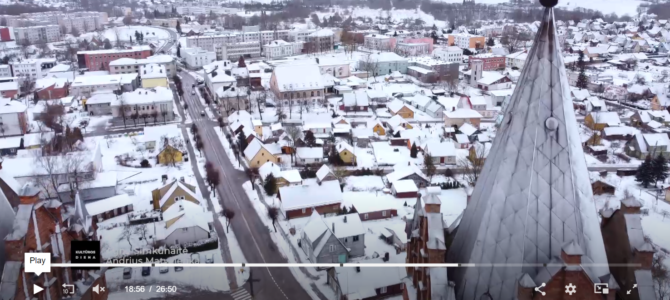

The surviving material culture of the former Kupiškis Jewish community, namely a mill which changed communal life once upon a time, is being restored in the small town in northeast Lithuania. For more, see here.
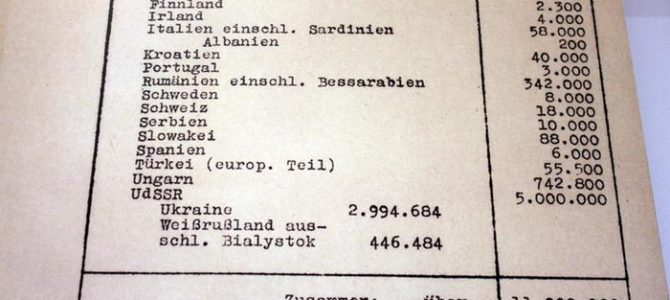
On January 20, 1942, details about the extermination of Europe’s Jews were discussed. Even 80 years later, the minutes of the Wannsee Conference send chills down the spine.
In March of 1947 as officials from the German Foreign Ministry tried to justify their actions at the Nuremberg Trials, Robert Kempner made a coincidental discovery. Amid the masses of documents left behind by the Nazis, a cover page piqued the curiosity of the assistant US chief counsel. A stamp in red ink is clearly legible on the page: “Secret Reich Matter.”
Under the nondescript title “Minutes of Meeting,” 15 pages serve as evidence of the systematic execution of European Jews. It is a record of the Wannsee Conference, which took place on January 20, 1942. It is the 16th set of minutes–the only one remaining of a set of 30.
At noon on that day, 15 men who had accepted an invitation from Reinhard Heydrich, head of the dreaded Reich Main Security Office, arrived to a lavish villa in the posh Berlin suburb of Wannsee. The temperature outside was -12 degrees Celsius (10 F), and the frigidness behind what was discussed within the walls of that villa still sends chills down one’s spine today.
Full story here.
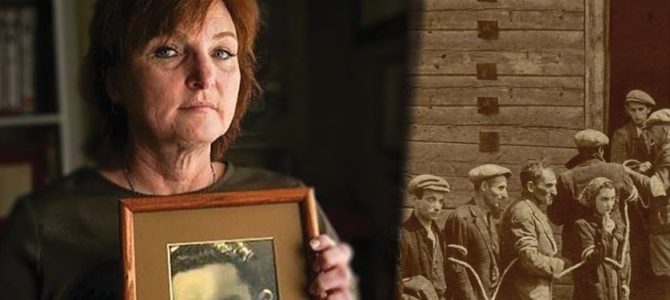
A report on the Lithuanian news site 15min.lt says Silvia Foti will speak at the Vilnius Book Fair to be held from February 24 to 27 this year. Foti will launch the Lithuanian translation of her book about her grandfather, Lithuanian Nazi war criminal Jonas Noreika.
Full story in Lithuanian here.
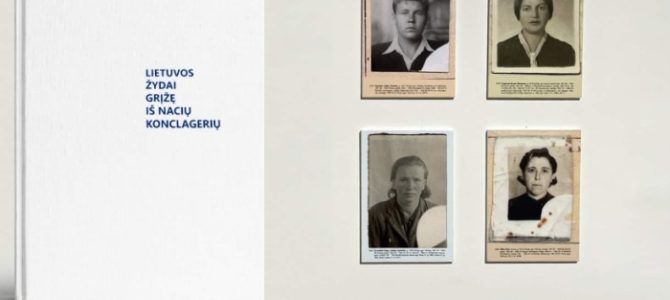
The Martynas Mažvydas National Library and its Judaica Center will open an exhibit of photographs, present a book about and hold a discussion on Lithuanian Jews who came back to Lithuania from concentration camps on at 6:00 P.M. January 26. The event will be hosted by director of the Judaica Center Lara Lempertienė and the discussion panel will include several Lithuanian historians and academicians. The discussion will be held in Lithuanian.
“The main target of my searches was people’s faces,” Kęstutis Grigaliūnas, author of the book “Lietuvos žydai, grįžę iš nacių konclagerių” [Lithuanian Jews Who Returned from Nazi Concentration Camps] which will be presented, said in a press release on the library’s facebook page.
The library said the event is closed to people without proof of vaccination and that all faces must be covered by “at least an FFP2-level respirator,” except for people who are unable to cover their faces with such masks due to medical conditions, who must wear plexiglass face shields instead. The library also said attendees must use hand disinfectant and maintain physical distance at the event, and that registration is required.

The story of Anne Frank has captivated millions of readers, but no one knows how the Franks hidden in an Amsterdam annex were discovered in 1944. A team of cold-case researchers has just published a new theory of who might have done it and why.
A cold case team that combed through evidence for five years in a bid to unravel one of World War II’s enduring mysteries has reached what it calls the “most likely scenario” of who betrayed Jewish teenage diarist Anne Frank and her family.
Their answer, outlined in a new book called “The Betrayal of Anne Frank: A Cold Case Investigation” by Canadian academic and author Rosemary Sullivan, is that it could have been a prominent Jewish notary called Arnold van den Bergh, who disclosed the secret annex hiding place of the Frank family to German occupiers to save his own family from deportation and murder in Nazi concentration camps.
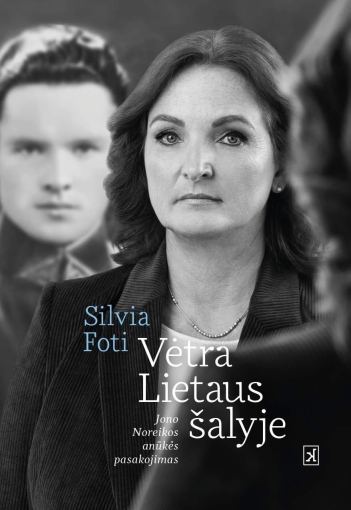
Lithuanian publisher Kitos Knygos has announced the impending launch of SIlvia Foti’s book about her grandfather Jonas Noreika in Lithuanian under the title “Vėtra Lietaus šalyje” [Storm in the Rain Country].
“Journalist Silvija Kučėnaitė-Foti (born 1961) grew up in Chicago’s Lithuanian community hearing about her grandfather’s achievements fighting for Lithuania’s freedom. He was initiator of the June Uprising, imprisoned at the Stutthof camp by the Nazis and killed by the KGB when he returned to Lithuania,” Kitos Knygos wrote on their facebook page.
“Before she died, her mother asked Silvia to complete her mission, to commemorate General Storm in a book. Silvia agreed. Later when she was travelling in Lithuania she discovered people who believed Noreika as head of the Šiauliai district during the Nazi occupation perpetrated Holocaust crimes. Silvia, who considered her grandfather an important hero of the Lithuanian nation, found this incredible: could her family really have hidden from her salient facts in Noreika’s biography?
“In this literary memoir the author presents her 20-year-long investigation of her grandfather’s actions in 1941. This is the story of the author’s own difficult road to learning the truth about her family. Foti relies upon Noreika’s correspondence, orders signed by him, documents issued by the Lithuanian Activists Front and KGB and other documents. The book includes compelling portraits and recollections from Noreika’s fellow travellers.
“This will be an authorized and checked edition. Martas Geležauskas translated from English, Darius Pocevičius translated Russian-language KGB documents and Asta Bučienė and Aira Naiuronytė edited the text. Kazimieras Dainovskis did design.”
Lithuanian publisher’s facebook page here.

A Kabalat Shabbat ceremony will be conducted by internet at 6:00 P.M. on January 21. To register contact Viljamas at viljamas@lzb.lt
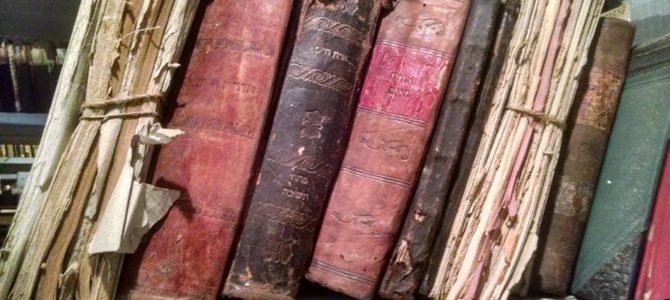
Dear Faina,
Today, I am delighted to announce that The YIVO Institute for Jewish Research (YIVO) completed the Edward Blank YIVO Vilna Online Collections Project (EBYVOC), a historic 7-year, $7 million international initiative to process, conserve and digitize YIVO’s divided prewar library and archival collections.
These materials, divided by World War II and located in New York and Vilnius, Lithuania, have now been digitally reunited for the first time.
Comprising approximately 4.1 million pages of archival documents and books, the EBYVOC Project is an international partnership between YIVO, the Lithuanian Central State Archives, the Martynas Mavydas National Library of Lithuania, and the Wroblewski Library of the Lithuanian Academy of Sciences.
The completion of the EBYVOC Project is an epic milestone in the preservation of Eastern European Jewish history and culture. It was completed on schedule and within budget, providing a global audience access to these treasures through a dedicated web portal free-of-charge. We invite you to explore this remarkable collection at https://vilnacollections.yivo.org/.
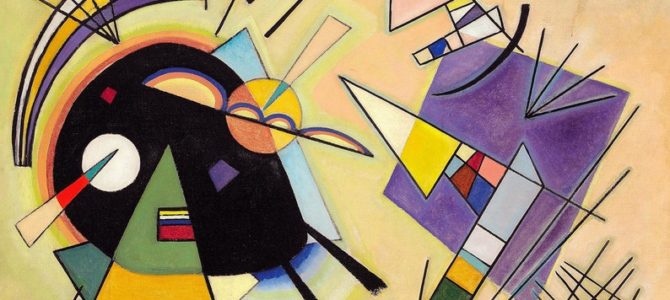
The Sabbath begins at 4:04 P.M. on Friday, January 14, and concludes at 5:27 P.M. on Saturday in the Vilnius region.
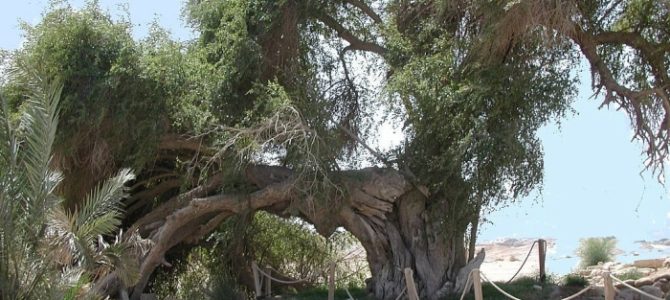
Monday, January 17, is the Jewish holiday of Tu b’Shvat, the 15th day of the month of Shvat, the New Year for trees also known as Israeli Arbor Day. It is traditional to eat of the shvat ha’minim (seven species endemic to the Land of Israel): wheat, barley, grapes, figs, pomegranates, olives and dates. Hag sameakh!
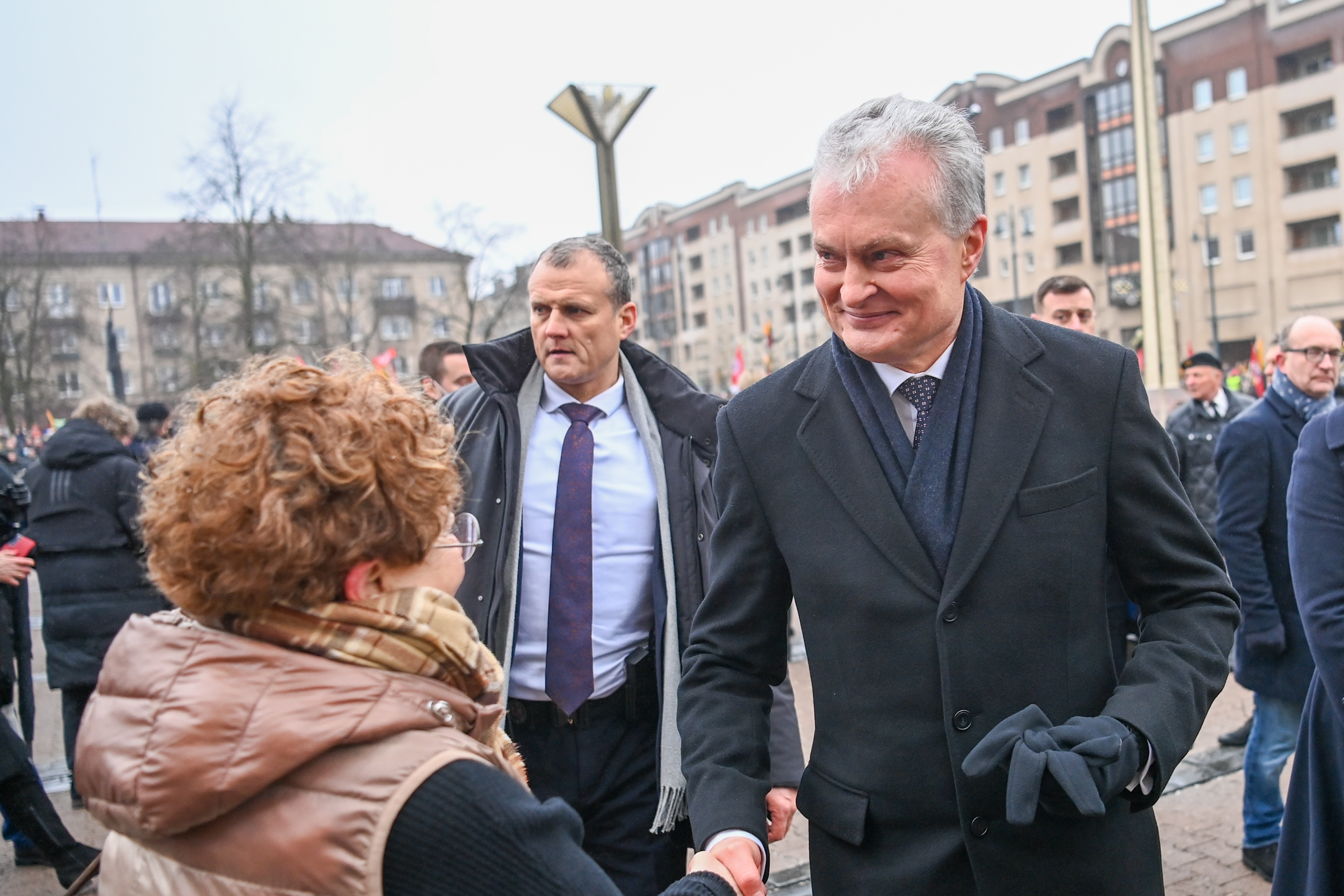
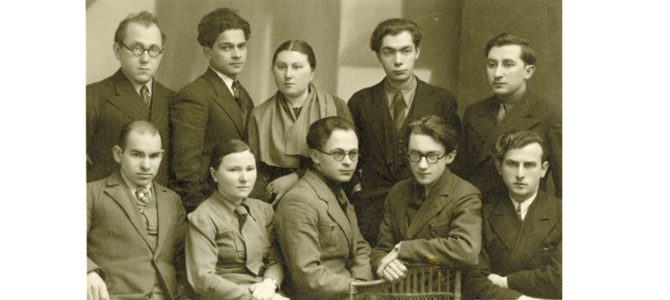
Photo: Jung-Vilne literary group: Chaim Grade is standing in the top row to the left, the poets Shmerke Kaczerginski and Abraham Sutzkever are seated in the middle. YIVO archives
by Susanne Klingenstein and Yehudah DovBer Zirkind, In Geveb, December 15, 2021
INTRODUCTION
When on May 2, 2010, Inna Hecker Grade passed away at the age of eighty-five, a sigh of relief, unkind and hard-edged, coursed through some corners of the Yiddish literary world and a small circle of scholars and archivists tensed with expectation. For twenty-eight years, since the passing of her husband Chaim Grade on June 26, 1982, the literary legacy of one the most important Yiddish prose-stylists and documentary storytellers to emerge from the ashes of Vilna, had lain concealed in the couple’s Bronx apartment, guarded by his angry widow who deemed the world unworthy of her husband’s genius. After a brief foray into the publishing world, she had withdrawn into a tomb filled with her husband’s treasures.
The sepulchral metaphor was first used by Ralph Speken, the psychiatrist who had taken care of Inna Grade during the last months of her life. On the eve of breaking the seal, Speken pleaded: “They should take over that apartment as if they were taking over King Tut’s tomb.” Scholars and readers expected the discovery of manuscripts in drawers and closets that would speedily be published, perhaps in critical editions, and bring Grade back to literary life. No new work, no critical edition or biography has yet appeared.
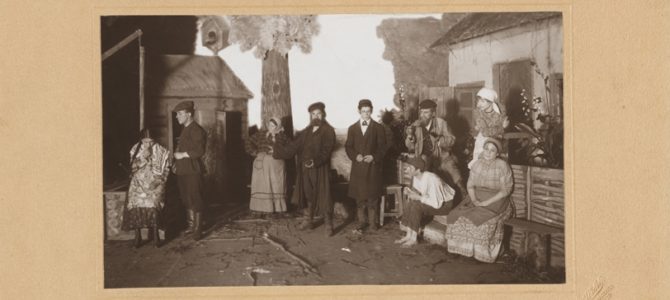
Photo: Alter Kacyzne. “Green Fields” theater still. ca. 1921. Museum of the City of New York.
text by Yitskhok Niborski, translated from Yiddish by Yankl Salant
Kacyzne, Alter-Sholem (May 31, 1885-July 7, 1941)
(1885–1941), Yiddish writer and critic; photographer. Born in Vilna to a working-class family, Alter-Sholem Kacyzne (Yid., Katsizne) attended heder and also a Russian-language Jewish elementary school. At 14, after his father’s death, he stopped his formal studies. Kacyzne was an autodidact and remained an avid reader not only of literature in Russian, Yiddish, and Hebrew, but also of Polish, German and French works. For about 11 years he lived in Ekaterinoslav where he learned to be a photographer and was married.
In 1909, Kacyzne first published two Russian stories in the periodical Evreiski mir (Jewish World), edited by S. An-ski. In 1910, attracted by the work and reputation of Y. L. Peretz, Kacyzne settled in Warsaw, where he opened a photography studio. He grew very close to Peretz, who became a literary mentor, but did not begin publishing in Yiddish until after Peretz’s death in 1915. Kacyzne’s first Yiddish texts appeared in collections in Vilna and Kiev. In 1919 and 1920 his first two books were published in Warsaw, the dramatic poems Der gayst der meylekh (The Spirit, the King) and Prometeus (Prometheus). He was also a consistent contributor to (and sometimes co-founder and co-editor of) a series of literary periodicals, most of them short-lived, in Warsaw and Vilna, in which he published novellas and stories that in 1922 appeared in book form as Arabeskn (Arabesques).
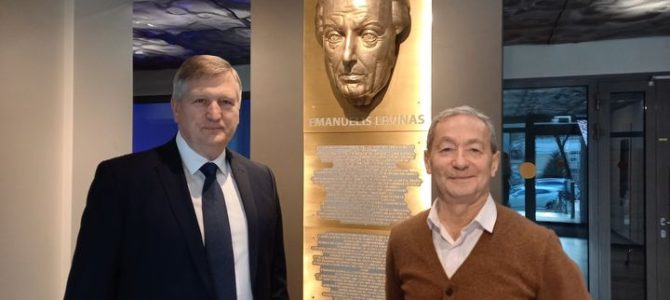
Kaunas Jewish Community chairman Gercas Žakas shared his impressions on facebook after visiting the Emmanuel Levinas Center opening ceremony:
“It was endlessly pleasant to receive an invitation from professor Rimantas Benetis, rector of the Lithuanian Health Medicine University, to meet at the recently-opened Emmanuel Levinas Center. We had a nice and warm conversation in which we discussed the Center’s mission, planned activities and opportunities for cooperation. I thank Center directors Ingrida Krasauskienė and Julija Vasilenko who conducted a tour of the impressive space of the Center with its extraordinary aura and possessing materializing visions of the future. I hope that the Center will be more than just an institution researching and promoting the philosophical, intellectual and cultural inheritance of the famous philosopher Emmanuel Levinas (1906-1995) born in Kaunas, as its articles of incorporation state, but also that it will become a new venue in Kaunas for memorable and meaningful meetings and events. And I also hope ties of partnership and cooperation will join the Levinas Center and the Kaunas Jewish Community, inspiring us to carry out numerous projects.”
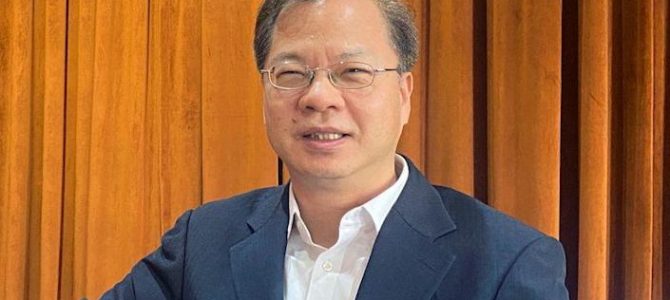
Photo: Taiwan National Development Council Minister Kung Ming-hsin poses during an interview with Reuters in Taipei.
Taiwan will launch a $1 billion credit program to help fund joint projects between Lithuanian and Taiwanese companies in six business categories, a Taiwanese government minister said on Tuesday.
Lithuania is under pressure from China, which claims democratically-ruled Taiwan as its own territory, to reverse a decision last year to allow the island to open a de facto embassy in Vilnius under its own name.
China has downgraded diplomatic ties with Vilnius and is pressuring companies such as German car parts giant Continental to stop using Lithuanian-made components. It has also blocked Lithuanian cargos from entering China. Taiwan last week announced plans to set up a separate $200 million fund to invest in Lithuanian industries and boost bilateral trade as it tries to fend off China’s diplomatic pressure on the Baltic state.
“The investment and credit funds will help us strengthen the cooperation,” Taiwan’s National Development Council minister Kung Ming-hsin told an online news conference.
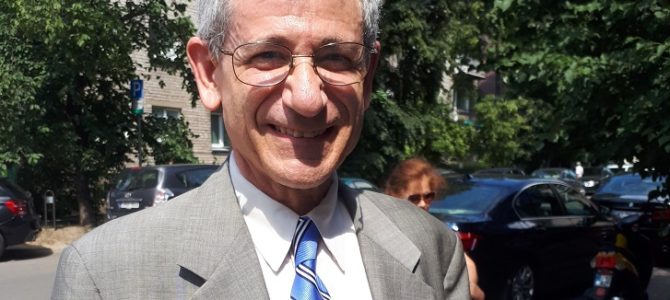
Dear Faina,
Today YIVO announces the completion of the Vilna Collection Project–4.1 million pages of documents and books online for people around the world–and you have been such a tremendous part of it. You introduced me to so many people, helped shepherd our grant through the Goodwill Foundation and advised on so many things. Thank you. This project truly opens new doorways for millions of people around the world. Without your support and enthusiasm I am not sure we would have been successful. I hope that when I am in Vilnius … we will be able to celebrate together.
Here is a link to the website: https://vilnacollections.yivo.org/
With my warmest good wishes for a healthy, happy, peaceful New Year,
Jonathan
Jonathan Brent
Executive Director/CEO
The YIVO Institute for Jewish Research
A Kabbalat Shabat ceremony will be held to usher in the Sabbath under the tenets of progressive Judaism at the Lithuanian Jewish Community in Vilnius at 6:00 P.M. on January 14, followed by a glass of wine and challa bread. To register, write Viljamas at viljamas@lzb.lt or call 8 672 50699.
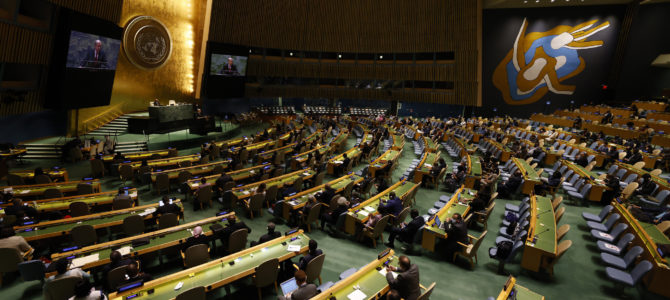
Times of Israel
Envoy confident measure will pass overwhelmingly later this month; it won’t have enforcement mechanism, but Erdan says effects of new international standard will be significant
Israel will bring a resolution aimed at combating Holocaust denial for a vote before the United Nations General Assembly later this month, Ambassador Gilad Erdan announced on Wednesday.
The resolution will provide a specific classification for Holocaust denial, using the working definition put together by the International Holocaust Remembrance Alliance. It will provide actions expected of signatory countries in order to address the phenomenon, and will demand social media networks remove posts that fall under the IHRA definition, Erdan said in a briefing with reporters.
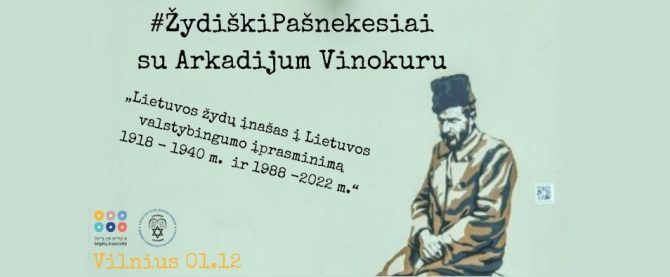
Arkadijus Vinokuras will moderate a discussion on Jewish contributions to Lithuanian statehood from 1918 to 1940 and from 1988 to 2022 as part of the #ŽydiškiPašnekesiai series of talks at the Bagel Shop Café in the Lithuanian Jewish Community in Vilnius at 5:00 P.M. on January 12. This is the eve of January 13, an important date in modern Lithuania’s history, the morning on which Soviet tanks attacked and killed citizens defending the Vilnius television tower in 1991. Participants are to include father of Lithuanian independence Vytautas Landsbergis, Lithuanian Jewish Community chairwoman Faina Kukliansky and Lithuanian MP and signatory to the 1990 Independence Act Emanuelis Zingeris, among others.
Musical accompaniment is to be provided by Vytas Mikeliūnas on violin and Darius Mažintas on piano performing Lithuanian and Jewish songs. The discussion will be held in Lithuanian. Those wishing to attend may come in person or watch the live-feed on the LJC facebook page.
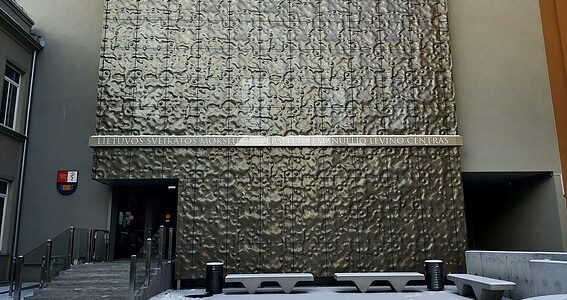
Valdemaras Šukšta, LRT.lt
Michael Levinas, the son of Litvak French philosopher Emmanuel Levinas, isn’t happy a center was named after his father in Kaunas. He said his objections because of the Holocaust weren’t taken into consideration. The Levinas Center is part of the Lithuanian Health Sciences University who claim Levinas’s daughter and grandson liked the idea.
Michael Levinas explained his position on the internet page of the French newspaper Le Figaro in late December. His main objection was the anti-Semitism and crimes against humanity aimed at Jews in the Holocaust in Lithuania. He pointed out the center is located near the apartment where his father lived, and where his father’s family was abducted and taken to the Ninth Fort where they were subjected to the depredations of the Nazis and Lithuanians.
The younger Levinas recalled he had received a letter from then-rector of the Lithuanian Health Sciences University Remigijus Žaliūnas in 2019 in which Žaliūnas is alleged to have said his wishes would not be taken into consideration and there would be no further discussion of the matter. Levinas said his father repeated vowed never to visit Lithuania again and not to have anything to do with the country.